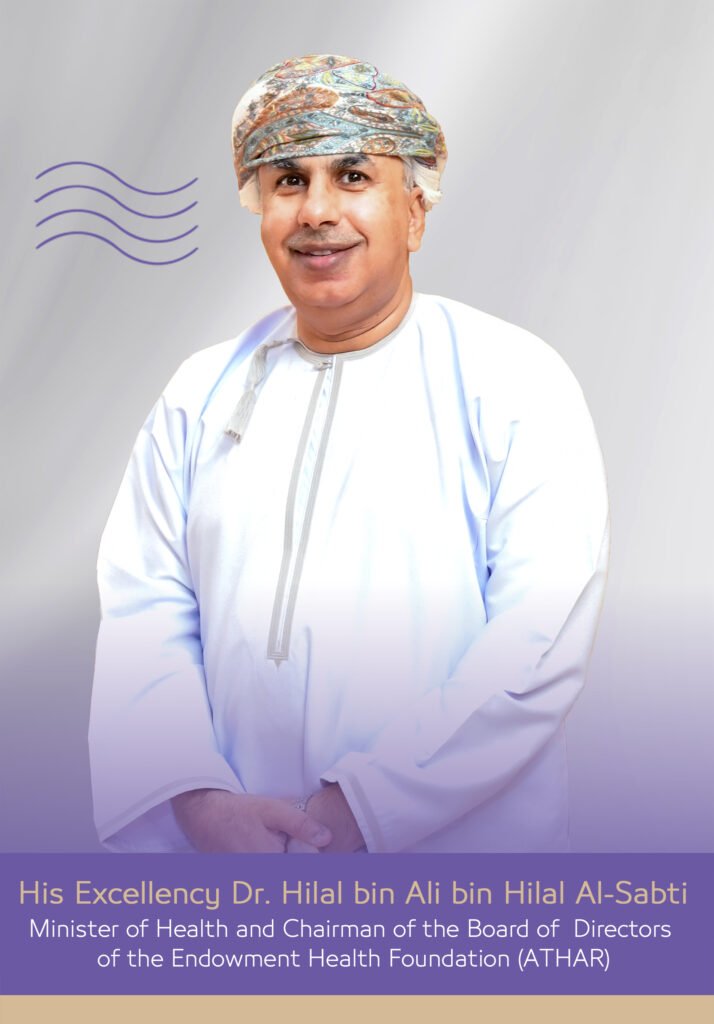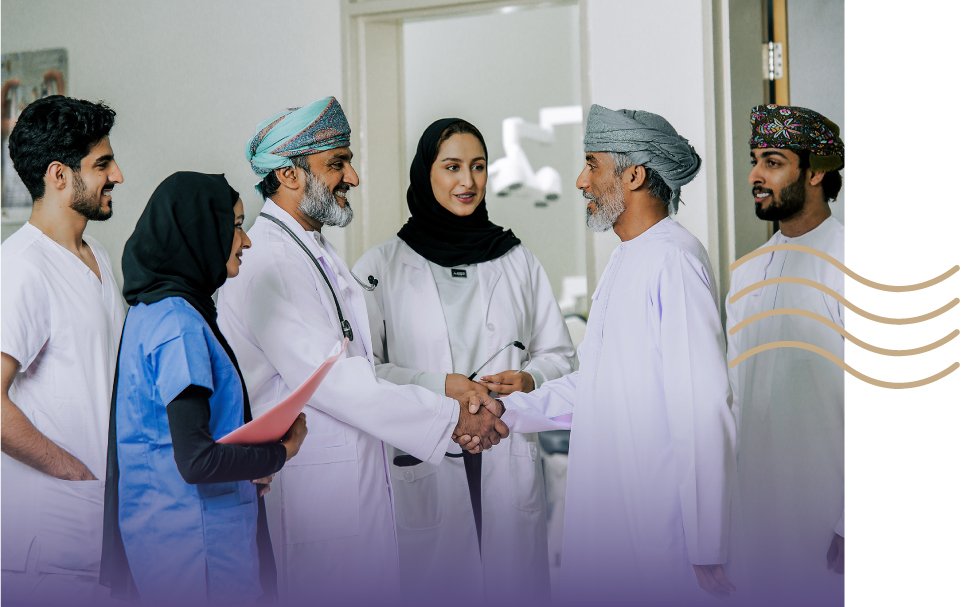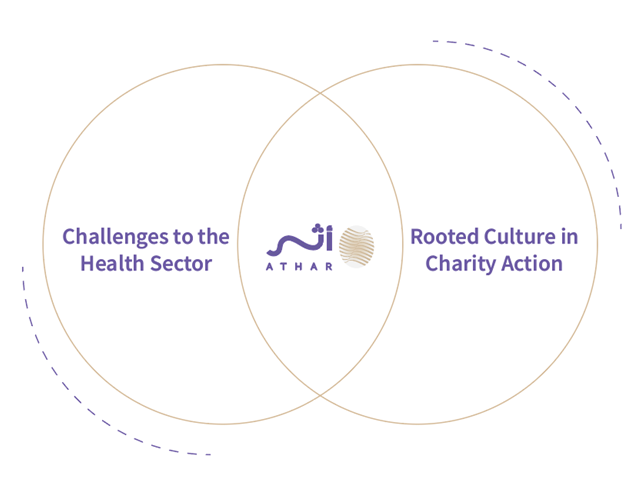Who is Athar …
The Health Endowment Foundation (Athar) is a non-profit organization that seeks to support the health sector in the Sultanate of Oman to improve the level of health care in the long term through your contributions, with the aim of reaching the integration of health care delivery and achieving sustainable health development for members of the Omani community.
Chairman's Message
Coming Together for Oman

The Health Care Sector At the Forefront of Life and Development
“…and whoever saves a life, it will be as if they saved all of humanity.”
(Quran 5:32)

A Government that Champions Health
In Oman, the government has grasped the importance of the healthcare sector ever since the national renaissance began in 1970. In the first year after the late Sultan Qaboos bin Said ascended the throne, the government began to establish hospitals, and the Basic Law of the State stipulates that caring for people’s health must be of utmost importance. As the Basic Law states: “The State is responsible for public health and the means of prevention and treatment of diseases and epidemics. The State endeavors to provide health care for every Citizen and encourages the establishment of private hospitals, polyclinics and medical institutions to be under its supervision and in accordance with regulations determined by the Law. The State also works for the conservation of the environment, its protection, and the prevention of pollution.”
Growth of healthcare facilities during the Omani renaissance:
1970 | 7 health care institutions |
2021 | More than 1500 public and private health care institutions |
The Health Care System in Oman
Most governments realize that their power lies in their people’s ability to effectively contribute to the development process. This leads them to dedicate a large portion of their annual budget to this vital sector. In fact, government healthcare expenditures make up 10% of the global GDP.[1]
Because the Omani government believes in the importance of health care as part of its system for citizens’ welfare, it offers its citizens health care practically for free. The provision of these health care services depends on government spending, represented in building and operating facilities and services. According to the Ministry of Health’s 2021 annual report, the Ministry spent approximately 883.5 million Omani riyals in 2021.[2]
Government spending on the healthcare sector also made up a greater proportion of total government spending than it had in the past. The Ministry of Health’s 15-Year Health Care Development Plan (2021–2025) is one recent move to improve the health care system in Oman. The government has communicated how crucial it is to prioritize the healthcare sector in Vision Oman
2040 so better and more comprehensive services can be provided to Omanis and residents. Other sectors and related entities will get involved in the implementation process. Some of the most important examples of sectors that support the health care system are municipalities, environment and water, education, social development, agriculture, youth, sciences, electricity, and communications and media. These sectors help the health care sector integrate into the overall development framework.
The public health care system in Oman consists of three levels, each of which complements the others to provide comprehensive health care to everyone in the sultanate.
[1] https://apps.who.int/gho/data/view.main.GHEDGGHEDGGESHA2011REGv?lang=en
[2]2021 Annual Health Care Report, Ministry of Health.
The Public Health Care System
| # | Public hospitals | Private hospitals | Public hospitals
not affiliated with the Ministry of Health |
Total |
|---|---|---|---|---|
| Hospitals | 51 | 27 | 6 | 84 |
| Beds | 5238 (73%) | 1117 (15.5%) | 813 (11.5%) | 7168 |
- 51 – Hospitals
- 21 – Medical complexes
- 190 – Medical centers
- 27 – Hospitals
- 432 – Health complexes and specialized clinics
- 302 – Dental clinics
- 496 – Public clinics and diagnosis centers
- 794 – Pharmacies
Challenges in the Health Care Sector
As a result of the social and economic transformations Oman has gone through over the past five decades, the country has seen rapid growth in its Omani and foreign-born populations. The population of the sultanate was 4,471,148 in 2022, a 146% increase since 1990. The population grew 2.5% just between 2020 and 2022, and the number of people living in Oman is expected to reach 5.7 million by 2050. It is also projected that there will be 1.13 million elderly people by the same year. These indicators demand that we prepare to provide basic, high-quality health care to a larger number of people.
1,812,157 | Total population in 1990 |
4,471,148 | Total population in 2022 |
5,700,000 | Expected total population by 2050 |
Oman’s natural environment ranges from mountains to deserts and coasts to valleys. Population centers are spread out across a wide geographic area. Muscat and Al Batinah (North and South) Governorates have the highest population density; approximately 40% of Omanis and 60% of foreign residents live in those areas. The remaining population is spread out among numerous far-flung villages and cities, posing a significant logistical challenge and exponentially increasing the cost of providing comprehensive health care.
Ministry of Health statistics indicates that 72% of deaths recorded in recent years are the result of non-communicable diseases, such as cardiovascular diseases, cancer, respiratory diseases, diabetes, high blood pressure, and high blood cholesterol. Unfortunately, the sultanate records 7500 cases of diabetes each year, and diabetes is the leading cause of kidney failure. Cases of obesity have risen sharply due to unhealthy lifestyle habits; approximately 66% of adults suffer from being overweight. This change has been accompanied by a rise in the number of people affected by illnesses, leading to a marked
increase in rates of chronic illness. Each day, 11 people die of non-communicable diseases. These exploding figures, and the repercussions of such illnesses, place a huge burden on the healthcare system. The problem requires a sustained strategy to reduce the financial burden on the health care system.
Oman is located on the Indian Ocean, in an area vulnerable to occasional natural disasters. These events, like the Shaheen and Gonu cyclones and others, have posed a challenge to the health care sector. The sector’s assets may be directly harmed during such disasters, and an increased number of patients need care in affected areas. The coronavirus pandemic also presented a significant challenge to all healthcare systems worldwide and transformed the distribution of epidemic disease. The estimated cost of handling the coronavirus pandemic was OMR 121,069,220.155, straining the capacities of the healthcare sector and the government.
Training medical staff is both very expensive and absolutely crucial, as it is connected to human life itself. Most tools, technologies, medicines, laboratories, etc. are becoming more expensive. This is compounded by the many complexities of medical science and the rapid changes in epidemics and diseases, given the rapid changes in people’s lifestyles and activities.
The number of doctors per 10,000 people decreased significantly between 2018 and 2021.
Year | Number of doctors per 10,000 people |
2018 | 21 |
2021 | 19.9 |

How Challenges and Potential Create Opportunity
A wise person will see opportunities in challenges, realizing the valuable potential for innovation and positive change. This is where the idea of founding the Health Endowment Foundation (ATHAR) came from.
There are existing and ongoing challenges in the health care sector, especially in times of crisis, and the wellbeing and health of Omanis and residents are our top priority, a shared responsibility of all social institutions. Against this backdrop, the formation of ATHAR by the Ministry of Endowments and Affairs was announced. The entity was formed under Ministerial Decision No. 283/2020 to support the Omani healthcare system using the concept of alternative financing for the public and private sector. ATHAR aims to engage the community and launch initiatives, projects, and investments that serve all segments of society throughout Oman.
Humanity's Goal: Building a Better World
Allah has created people on this earth to build it up in various ways that would improve their lives in all aspects. People build up the world to preserve their souls, their honor, and their relationships with their fellow citizens and the world. They may do so through exploration and innovation, or through agriculture, commerce, education, manufacturing, or any other kind of development. The health care system is the foundation of the edifice of society.
“He ˹is the One Who˺ produced you from the earth and settled you on it.”
(Quran 11:61)
Mutual Aid: An Ingrained Omani Value
Omani society has always been known for being cooperative and exalting the values of shared prosperity. It has taken particular interest in the idea of creating endowments for all kinds of purposes, beginning with endowments for religious sites but extending to ones for roads, orphanages, public spaces, and irrigation. Endowments were also created for houses of knowledge and schools. For example, one of the oldest recorded endowments is that of Imam Warith bin Kaab al-Kharusi in Wadi al-Maawil and some surrounding areas, which has now been operating for 1200 years. This is an agricultural endowment whose proceeds are still distributed to beneficiaries to this day.
Today, there are more than 285 endowment assets and public funds organized under the umbrella of the Ministry of Endowments and Religious Affairs, confirm the growing social interest in cultivating goodwill for future generations.
In Islamic history, health care services such as treatment, operations, medicine, and food were free, thanks to the endowments set aside by Muslims for humanitarian efforts. Health care was, until recently, an act of devotion in all Islamic countries. There were no ministries of public health as there are in the modern period.
Endowments benefited the rise of medical sciences because the hospitals paid for by the endowments not only provided treatment but went to far as to teach science. There were lecture and study halls inside large hospitals.

The Gift that Keeps on Giving
Spending on humanitarian pursuits is like a generous tree whose fruits never run out. Aside from the direct effects, like improving the services provided to beneficiaries, spending creates a chain reaction of positive and sustainable transformations that might not be immediately obvious. It deepens the social feeling of responsibility toward others, spreads a culture of mutual aid, helps the needy, and creates a sustainable system whose effects will be felt for many generations to come.
“The example of those who spend their wealth in the cause of Allah is that of a grain that sprouts into seven ears, each bearing one hundred grains. And Allah multiplies ˹the reward even more˺ to whomever He wills. For Allah is All-Bountiful, All-Knowing.”
(Quran 2:261)